7 Chapter 7: Resources at the College of DuPage Library
Chapter 7: Resources at the College of DuPage Library

Career questions are some of the most personal to students. They are stressful, overwhelming areas to research at times and now is definitely not the time to settle for what Google or friends advise. Choose to be selective with where you get your information and you’ll be happy that you did. Let’s take a look at some of the most recommended places to get career information.
The Library (of course!)
Whether you are just getting started or have decided on a field, your first stop should be the Library. They have thousands of books on careers and emerging fields. The College and Career Collection, found on the upper floor of the Library, is easy to browse and all items can be taken home for further study. You’ll even see books for help with choosing majors and preparing for exams like the GRE, LSAT and ASVAB.
There are also eBooks that you can read on any device. Simply search the online catalog on the Library’s website using words that describe the career.
Sample searches:
- education careers
- nursing vocational guidance
- information technology careers
The Occupational Outlook Handbook
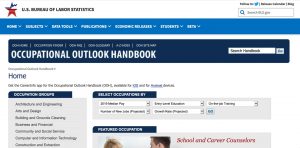
From the U.S. Department of Labor’s Bureau of Labor Statistics, OOH is a favorite source because it is comprehensive and current. With over 325 occupational profiles, OOH provides information about what the job does, qualifications needed and the outlook on the career.
Students tell us they like the detailed profiles but also the ability to search the occupations by pay, entry level education and projected growth rate.
My Next Move
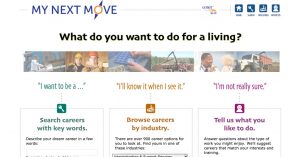
My Next Move has tasks, skills, salary information, and more for over 900 different careers. Using this site will expose you to many careers you haven’t even heard of because they list so many options. Profiles are brief but can quickly lead you to explore others. If you are in the beginning stages of career research and are undecided, this site is a good option to start with.
Students tell us they like short, one page profiles and the video interviews.
O*NET Online
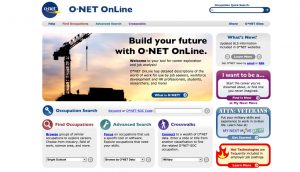
The O*NET database includes information for over 970 occupations covering skills, abilities, knowledges, work activities, and interests associated with the occupation. The advanced search lets you browse by abilities, interests, knowledge or skills.
Students tell us that they use this site with their Strong Interest Inventory results as a starting point. It has also been useful for veterans exploring careers based on their training from their military experience.
Career Outlook
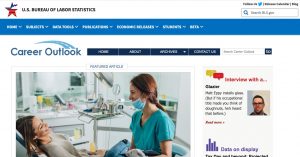
https://www.bls.gov/careeroutlook/home.htm
Career Outlook is different. Sourced from the Bureau of Labor Statistics, this site is primarily articles. They offer feature articles but also interviews and visuals about employment.
Students like this source for exploring unusual occupations and for getting charts and graphs about employment.
Illinois Career Information Systems (CIS)
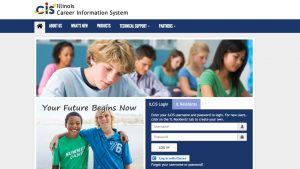
Illinois CIS is the site to use for getting local information about careers. If you plan to stay in Illinois and work, research here for salary information, job outlook and any licensing requirements. It can even tell you how popular a career is in DuPage County. Many students want to move out of Illinois. If this is you, ask the Library to recommend the CIS site for the state of interest to you.
Students turn to this site for local information about their career choice. The “Reality Check” game is also a favorite for testing out your expected lifestyle.
What Can I Do with My Personality Type?
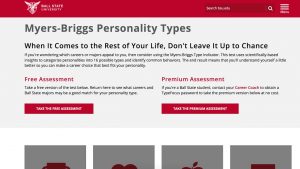
https://www.bsu.edu/about/administrativeoffices/careercenter/tools-resources/personality-types
Available to us from Ball State University, What Can I do With My Personality Type is helpful for exploring careers and majors once you have your Myers-Briggs results. They offer a free assessment if you haven’t yet received your results in class.
Students with their results often find this site the best to start with it since it’s easy to find specific types among the 16 listed.
What Can I Do with this Major?
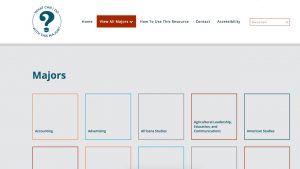
https://artsci.utk.edu/future-students/need-a-major/what-can-i-do-with-this-major/
From the University of Tennessee Center for Career Development, What Can I Do With This Major? lets you easily explore majors and connect them with careers. You’ll get typical career areas with types of employers that hire people with each major. Strategies for making yourself more marketable in that field are provided as well.
Students like this site for identifying types of employers and getting connections to the professional organizations for that career.
What’s your next step?
Now that you have some sources to start with, build a schedule to allow time to read and think about what you find. Create a system to organize your sources and thoughts about what you have found. Give yourself permission to revisit sources. You may uncover something new or different. Ask for help if you aren’t satisfied with your sources or don’t understand it. It’s ok to ask. Librarians are deeply committed to helping you find relevant information that you want to use. Remember, now is not the time to settle for “ok” sources.
The Library offers FREE appointments for research help any time they are open open. https://library.cod.edu/ Of course you can always drop in or chat with them online, but students tell us that they book appointments because it makes them commit to getting started plus their time is used wisely in that the librarian prepares for the visit in advance.

